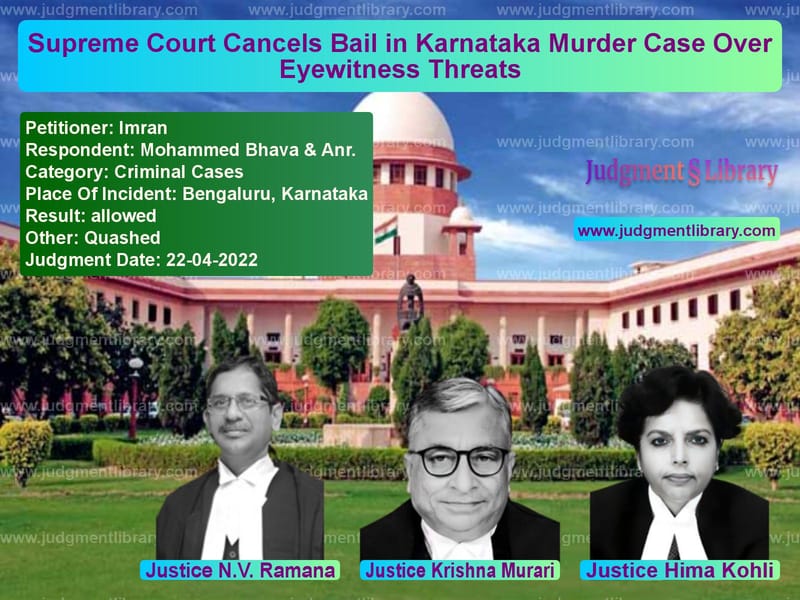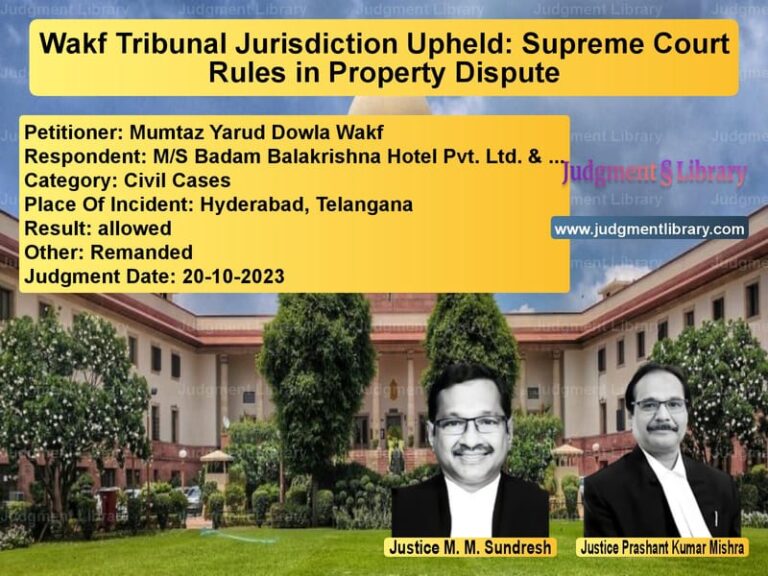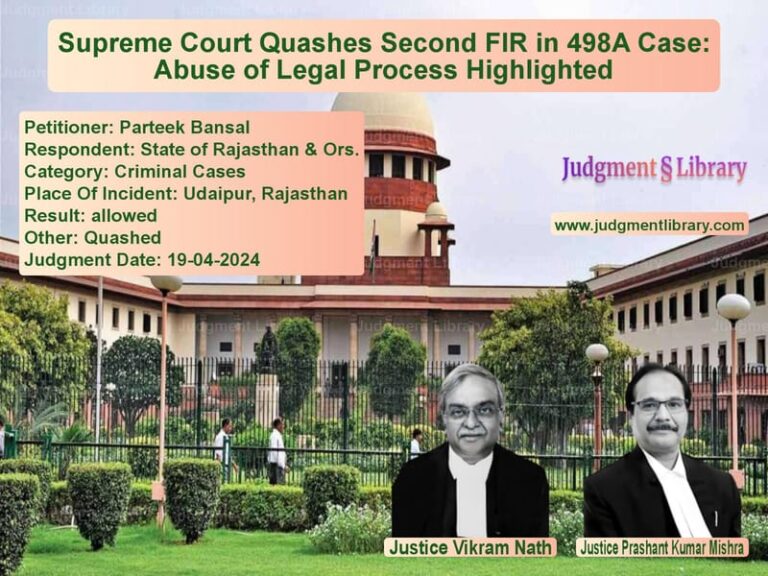Supreme Court Cancels Bail in Karnataka Murder Case Over Eyewitness Threats
The case of Imran vs. Mohammed Bhava & Anr. concerns the cancellation of bail granted by the Karnataka High Court to two accused individuals involved in a premeditated murder. The Supreme Court overturned the bail order, citing the gravity of the offense, eyewitness testimonies, and the risk posed to the prosecution’s case.
Background of the Case
The case arose from the murder of Abdul Lathif, which was allegedly part of a conspiracy orchestrated by multiple accused, including Accused No. 6, Mohammed Bhava, and Accused No. 8, Mohammed Musthafa. The prosecution contended that the accused were part of an armed group that attacked the victim and eyewitnesses.
Key events:
- On June 5, 2020, Abdul Lathif was murdered near HDFC Bank, Mulki Branch.
- The First Information Report (FIR) No. 38/2020 was registered under multiple sections, including 302 (murder), 307 (attempt to murder), and 395 (dacoity) of the IPC.
- Accused No. 1, Davood Hakim, allegedly conspired with other accused to eliminate an individual named Badrul Muneer.
- Accused No. 2 to 10 intercepted a car carrying the victim, assaulted eyewitnesses, and killed Abdul Lathif.
- Accused No. 6 allegedly instigated the attack, stating that “this is not the end, more will happen.”
- Accused No. 8 allegedly struck the victim with a wooden stick while others continued the attack.
Arguments of the Petitioner (Imran – Son of the Deceased)
- The petitioner argued that the High Court ignored the gravity of the offense and granted bail without considering vital evidence.
- Eyewitness testimonies and forensic reports directly implicated the accused.
- Other co-accused had their bail canceled by the Supreme Court earlier.
- The accused posed a threat to witnesses and were already influencing the trial.
Arguments of the Respondents (Accused No. 6 and 8)
- The accused claimed they were falsely implicated due to personal enmity.
- They were not present at the crime scene and did not participate in the attack.
- The statements against them were added later and lacked credibility.
- Since the other co-accused had been granted bail earlier, they should also be released.
Supreme Court’s Ruling
The Supreme Court, comprising Chief Justice N.V. Ramana, Justice Krishna Murari, and Justice Hima Kohli, overturned the bail order, emphasizing the seriousness of the crime and the role of the accused.
1. Bail Cannot Be Granted in a Mechanical Manner
The Court criticized the High Court’s order for failing to consider the severity of the offense.
“Grant of bail must be based on a careful consideration of the nature of allegations, prima facie evidence, and its societal impact.”
2. Eyewitness Testimonies Are Crucial
The Court emphasized the statements of over fifteen witnesses, which clearly implicated the accused.
“Statements suggest that Accused No. 6 and 8 directly participated in the assault.”
3. Threats to Witnesses Justify Bail Cancellation
The Court noted that the accused posed a threat to the prosecution’s case.
“Granting bail to individuals involved in a planned murder risks witness intimidation and obstruction of justice.”
4. The High Court Ignored Key Evidence
The Court ruled that the High Court failed to consider forensic reports and medical evidence.
“FSL reports confirm the use of deadly weapons, corroborating witness testimonies.”
5. Prior Bail Cancellations Set a Precedent
The Supreme Court had earlier canceled the bail of co-accused in the same case.
“Consistency in judicial decisions requires similar treatment for all accused.”
Final Judgment
- The Supreme Court set aside the High Court’s bail order.
- Accused No. 6 and 8 were directed to surrender within two weeks.
- If they failed to surrender, the police were ordered to take them into custody.
Impact of the Judgment
- Strengthens legal standards for granting bail in serious criminal cases.
- Reaffirms the need to consider witness protection in murder cases.
- Ensures judicial consistency in similar cases.
Conclusion
The Supreme Court’s ruling in Imran vs. Mohammed Bhava sets an important precedent on bail jurisprudence. By prioritizing the gravity of the offense and the protection of witnesses, the judgment reinforces judicial responsibility in cases involving heinous crimes.
Petitioner Name: Imran.Respondent Name: Mohammed Bhava & Anr..Judgment By: Justice N.V. Ramana, Justice Krishna Murari, Justice Hima Kohli.Place Of Incident: Bengaluru, Karnataka.Judgment Date: 22-04-2022.
Don’t miss out on the full details! Download the complete judgment in PDF format below and gain valuable insights instantly!
Download Judgment: imran-vs-mohammed-bhava-&-anr-supreme-court-of-india-judgment-dated-22-04-2022.pdf
Directly Download Judgment: Directly download this Judgment
See all petitions in Murder Cases
See all petitions in Attempt to Murder Cases
See all petitions in Custodial Deaths and Police Misconduct
See all petitions in Judgment by N.V. Ramana
See all petitions in Judgment by Krishna Murari
See all petitions in Judgment by Hima Kohli
See all petitions in allowed
See all petitions in Quashed
See all petitions in supreme court of India judgments April 2022
See all petitions in 2022 judgments
See all posts in Criminal Cases Category
See all allowed petitions in Criminal Cases Category
See all Dismissed petitions in Criminal Cases Category
See all partially allowed petitions in Criminal Cases Category







